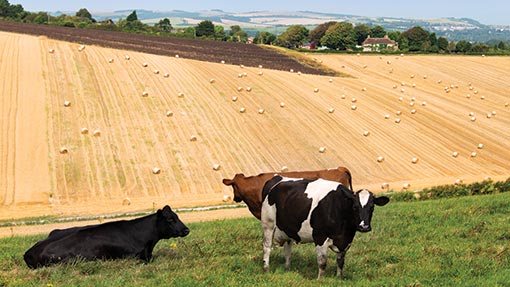Lower prices force farmers to reassess businesses

Farm businesses urgently need to address the implications lower prices and a 12% reduction in the 2014 single farm payment will have for cashflow, advisers have said.
Up to half of businesses are estimated to have taken no action to restructure or prepare for these changes.
“The recognition of harder times has been slow in filtering through to business actions, for example, in capital expenditure and land tendering levels,” said Philip Dunn, at Brown & Co, who urged farmers not to bury their heads in the sand.
Cashflow advice
- Revise cashflow plan and budget – up-to-date figures will help decision-making and to make a case for reducing January tax payments on account
- If no third-party advice, consider taking some
- Focus on core activities, plan for volatility and manage risk better through increased marketing activity
- Consider fixed-rate deals for some borrowing
- Ask searching questions of lenders about total cost of borrowing
- Challenge all costs
- Be realistic about drawings – who is the business supporting and can this be reduced?
- Ensure new projects are cashflow positive after debt service costs and resilient to volatility
- Consider selling easily liquidated assets if core debt is threatening an otherwise successful business (pony paddocks, garden extensions)
“Accept the current situation, don’t overstretch, work positively with your team – we have been here before.
“When the pressure is on, and particularly following a period of stronger returns, some businesses struggle to understand the downturn in prices is principally an external factor, but blame is often attributed within a business or a business relationship, putting strain on families and partnerships.”
See also: Business Clinic – development with minimum impact on farm business
Arable cashflow issues were just starting to show, said surveyor Judy Pearson of Berrys.
“Most are still riding high on the crest of good yields and an easier working year and haven’t calculated the effect on overall output of the reduced prices,” she said.
“Much depends on crop sales pattern, but typically output plus single farm payment on combinable crop farms is about £110/acre below a budget that would have been set this time last year – a significant figure, especially for tenants.”
Farm borrowing hit another new record of at the end of August, rising by 9% on the year to £15.9bn.
“We have seen a higher level of requests for increased working capital than would be usual at this time of year to accommodate the lower commodity prices, however we are expecting more in the coming months,” said Oliver McEntyre, national agriculture specialist with Barclays.
The bank took a long-term view of historically viable farming businesses experiencing short-term cashflow problems, he said.
“With that in mind, the current downturns in the markets will be felt with increasing pressure as we move through winter, into spring and beyond.
“My advice is simple: be proactive and plan your cashflow now for the coming 12 months, add in some sensitivity for price reductions and communicate well with your bank to secure the working capital you need until the markets improve.”
Wheat margins would be severely reduced despite the record crop, said NFU chief economist Phil Bicknell. “Asking for extra finance may not feel comfortable, but make sure that you’re maintaining the dialogue with your bank,” he said.
“Ensuring they are kept informed of changes or problems is essential to maintaining that relationship and will produce the best results.
“Also, if you’re considering a new source of finance, as with any offer, make sure you do your homework and understand exactly what you are taking on, including how much the total cost will be.”
There is anecdotal evidence of an increase in receivership sales, but higher land values have kept this to a low level.
However, some of the less understanding banks were piling additional pressure on businesses to have third-party accountancy input, over and above existing advisers, said Mr Dunn.
In the North West, land agent Tony Rimmer of Rostons said 2015 would be a tough year. “My big worry is in the dairy sector – the good operators will weather it, but up to 50% have made no significant change to their systems.”
There was more evidence of banks putting businesses into special measures and of landlords seeking to get land back in hand for the new Basic Payment Scheme, said Mr Rimmer.
